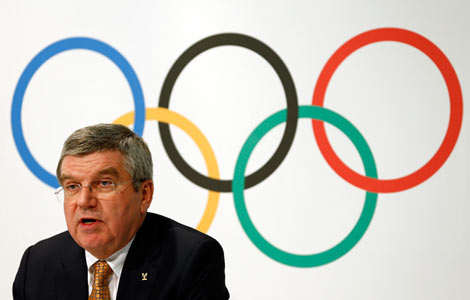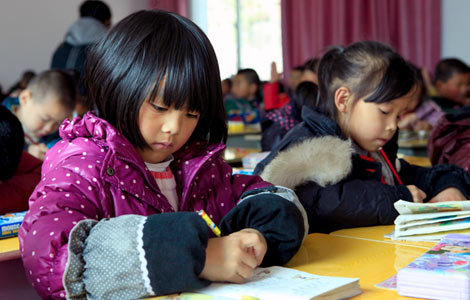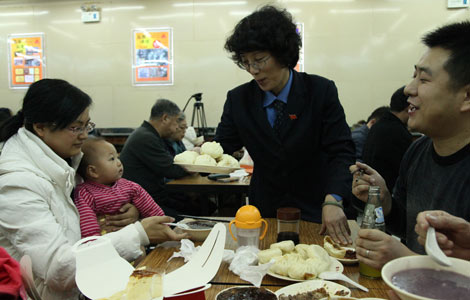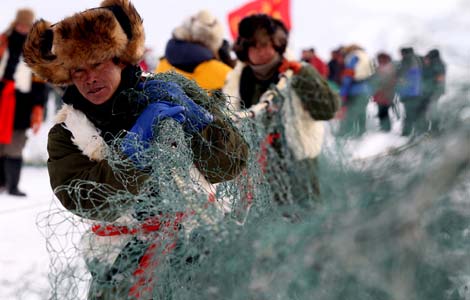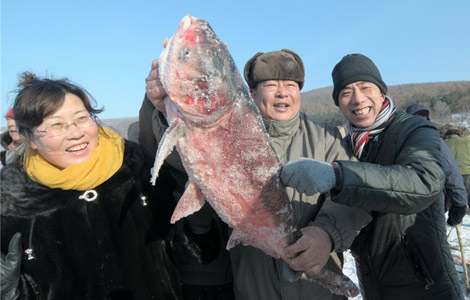Chinese FM calls for trust between China-US co-op
Updated: 2013-12-31 21:27
(Xinhua)
|
||||||||
BEIJING -- Chinese Foreign Minister Wang Yi has called for more strategic trust and practical cooperation between China and the United States on the eve of the 35th anniversary of the establishment of China-US diplomatic relations.
"The strategic dimension and global influence of China-US relations have become increasingly prominent," Wang said in a bylined article published by Xinhua on Tuesday, adding that the two sides have moved away from a state of no contact and become a community of intertwined interests over the past 35 years.
In the article, Wang reviewed the meeting between Chinese President Xi Jinping and US President Barack Obama last June in the United States. Wang said the two countries should turn the two leaders' consensus of building a new type of major-country relationship into concrete policies and measures and put them into practice.
Wang said the two countries should continue to strengthen strategic mutual trust, keep close engagement between senior leaders and at all levels, increase mutual understanding and avoid misunderstanding and misjudgment.
China is committed to peaceful development and always brings "positive energy" to promote world peace and development, said the foreign minister.
He urged the United States to have a correct understanding of China's strategic intention and take concrete actions to honor the stance stated repeatedly by its leaders that the United States welcomes a successful, strong, stable and prosperous China.
Only when China and the United States reassure each other and give up their suspicions and vigilance can the two countries share a more stable and smooth development of bilateral relations and a brighter future, Wang stressed.
The two countries should further advance bilateral investment treaty negotiations to achieve an early breakthrough, Wang said, urging the US side to lift export restrictions on high technology products to China and solve the problem of barriers for Chinese investors in the United States at an early date.
He said the two countries should increase dialogue and boost cooperation in areas including trade, investment, energy, environmental protection, and infrastructure, and complete a round of large-scale projects from which the Chinese and American people can benefit.
As for China-US military ties, Wang said the two countries should expand cooperation in peacekeeping, rescue and relief operations, fight against pirates, continue to carry out anti-terrorism cooperation, and make joint efforts to oppose terrorist activities in all forms.
The two countries should also carry out dialogue, exchanges and cooperation in nonproliferation, law enforcement, technology, education, sports, culture and health care, the foreign minister said.
With regard to global and regional issues, Wang said the two countries should continue to strengthen coordination on macroeconomic policy through multilateral mechanisms such as the G20, World Bank, and International Monetary Fund, and work together to promote the recovery and growth of global economy.
He called for more communication and coordination between China and the United States on regional problems, including the Korean nuclear issue, the Iranian nuclear issue, Syria, North and South Sudan, and Afghanistan.
Wang said the two countries should actively enhance cooperation on global problems such as climate change, energy security, food security, internet security and epidemic disease, and provide more "public products" for the international community.
The foreign minister urged the US side to properly handle "sensitive issues" in their bilateral relations, including Taiwan, Tibet and other major issues involving China's sovereignty and territorial integrity.
The United States should strictly fulfill the commitment it has made, and be cautious on the issues to prevent China-US relations from suffering any more setbacks, he said.
Wang also called for further exchanges between the legislatures, local governments, businessmen, scholars and students between the two countries to enhance mutual understanding and friendship and "make the call for cooperation the mainstream voice of the people in the two countries."
HISTORIC GROWTH
Wang said China-US relations have seen "historic growth" over the past 35 years.
"The establishment of diplomatic relations between China and the United States in 1979 could be the most significant strategic event in international relations in the latter half of the 20th century," said the foreign minister.
China and the United States are now each other's second largest trading partner, with bilateral trade growing 200-fold and investment topping 100 billion US dollars over the past 35 years.
In the past five years, the heads of state of the two countries have held 14 meetings. The two countries have developed more than 90 dialogue and cooperation mechanisms, including the Economic and Strategic Dialogue.
In 2013, nearly four million Chinese and Americans travelled between the two countries, compared to only a few thousand in 1979. Countless people from the two countries are now linked via daily flights across the Pacific, and through the Internet and mobile phones.
Now the two countries have far broader and closer cooperation on regional and international issues than 35 years ago. China and the United States have maintained close communication and coordination on addressing the global challenges of the international financial crisis, climate change, energy security and food security, as well as on regional hot-spot issues such as the nuclear issue of the Korean Peninsula, the Iranian nuclear issue and the Syria crisis.
Wang said history has proved that a healthy China-US relationship is not only in the fundamental interests of the two peoples, but also conducive to peace, stability and development of the Asia Pacific region and the world.
"In retrospect, the past 35 years have given us much enlightenment," said Wang.
Holding the correct orientation is the key to the development of the China-US relationship, he said.
"A peaceful China-US relationship makes both countries winners while a confrontational relationship makes both losers," said Wang. "Cooperation is the only right choice for both sides."
He called on both sides to take the fundamental interests of the people into consideration, adhere to the direction stated in the three joint communiques of China and the United States and the consensus reached by both leaders so as to ensure sustained development of bilateral ties on a healthy and stable track.
Seeking common interests is the driving force to promote the China-US relationship, Wang said.
As the largest developing country and the largest developed country in the world, China and the United States share extensive common interests and shoulder important common responsibility, he said.
He called on both sides to focus on common interests to carry out more cooperation.
Wang said it is "natural" for the two countries to have disagreement and differences, given differences in political systems, development levels as well as history and cultural traditions.
Mutual respect is the right path to control differences, he said.
So long as the two countries can respect each other's core interests and major concerns and gain mutual trust through dialogue and consultations, they can avoid disturbances to the development of bilateral ties, said Wang.
Wang also called for wide participation and strong support from the two peoples.
The friendship between the Chinese people and the US people is forever the vital foundation of bilateral ties, said Wang.
Both sides should explore more channels and encourage more communication so as to always maintain the vigor and vitality of the China-US relationship, he said.
"We are confident in the future of China-US relations," Wang said at the end of his article, adding that the two countries' goal of establishing a new type of relationship will "definitely" come true so long as the two sides follow the direction set by leaders of the two states and make concerted efforts with concrete actions.
- Trust-building needed to improve China-US ties
- New organization to encourage China-US tourism
- One man's podcast aims to bridge China-US gap
- Universities' role hailed in China-US cultural exchange
- China-US ties rooted in people-to-people bonds
- Experts talk about evolving China-US relationship
- China-US nuclear security center begins construction
- A life devoted to China-US ties
Most Viewed
Editor's Picks

|

|

|

|

|

|
Today's Top News
US analysts think Abe's shrine visit a mistake
Xi's bun shop visit wows media
Global retirement crisis looms
US train collision sparks fire
Beijing turns cold shoulder to Japan
70 journalists killed on the job
Xi to direct carrying out of reform
Abbas committed to peace talks
US Weekly

|

|

